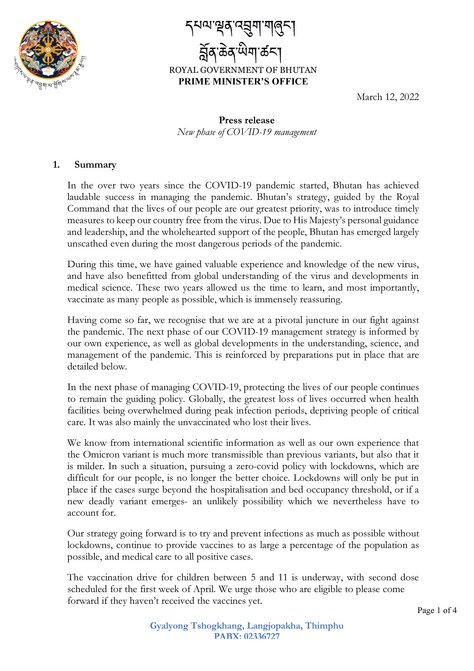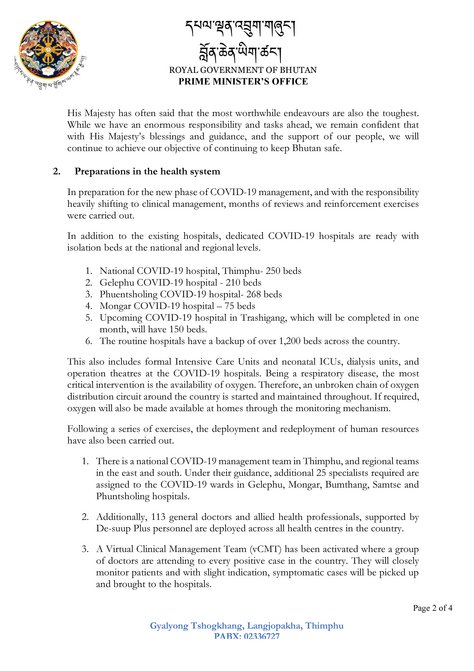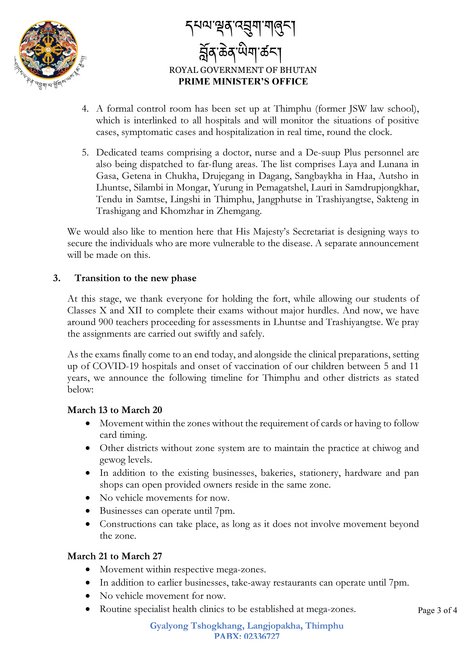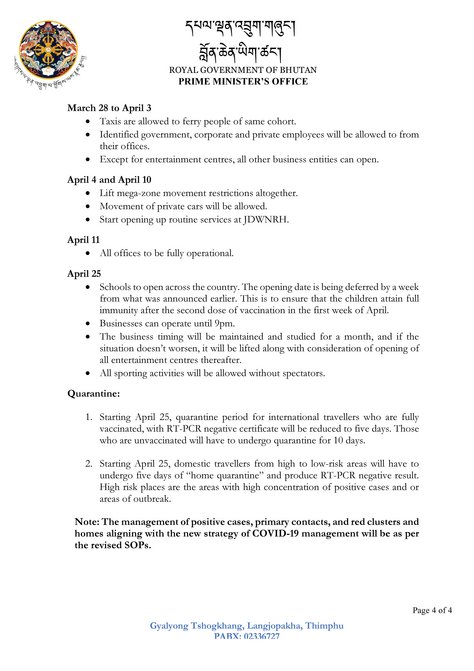12.3.22 – Press release New phase of COVID-19 management
Gyalyong Tshogkhang, Langjopakha, Thimphu, PABX: 02336727
ROYAL GOVERNMENT OF BHUTAN PRIME MINISTER’S OFFICE
དཔལ་ལྡན་འབྲུག་གཞུང་།
བློན་ཆེན་ ཡིག་ ཚང་།
March 12, 2022
Press release
New phase of COVID-19 management
1. Summary
In the over two years since the COVID-19 pandemic started, Bhutan has achieved
laudable success in managing the pandemic. Bhutan’s strategy, guided by the Royal
Command that the lives of our people are our greatest priority, was to introduce timely
measures to keep our country free from the virus. Due to His Majesty’s personal guidance
and leadership, and the wholehearted support of the people, Bhutan has emerged largely
unscathed even during the most dangerous periods of the pandemic.
During this time, we have gained valuable experience and knowledge of the new virus,
and have also benefitted from global understanding of the virus and developments in
medical science. These two years allowed us the time to learn, and most importantly,
vaccinate as many people as possible, which is immensely reassuring.
Having come so far, we recognise that we are at a pivotal juncture in our fight against
the pandemic. The next phase of our COVID-19 management strategy is informed by
our own experience, as well as global developments in the understanding, science, and
management of the pandemic. This is reinforced by preparations put in place that are
detailed below.
In the next phase of managing COVID-19, protecting the lives of our people continues
to remain the guiding policy. Globally, the greatest loss of lives occurred when health
facilities being overwhelmed during peak infection periods, depriving people of critical
care. It was also mainly the unvaccinated who lost their lives.
We know from international scientific information as well as our own experience that
the Omicron variant is much more transmissible than previous variants, but also that it
is milder. In such a situation, pursuing a zero-covid policy with lockdowns, which are
difficult for our people, is no longer the better choice. Lockdowns will only be put in
place if the cases surge beyond the hospitalisation and bed occupancy threshold, or if a
new deadly variant emerges- an unlikely possibility which we nevertheless have to
account for.
Our strategy going forward is to try and prevent infections as much as possible without
lockdowns, continue to provide vaccines to as large a percentage of the population as
possible, and medical care to all positive cases.
The vaccination drive for children between 5 and 11 is underway, with second dose
scheduled for the first week of April. We urge those who are eligible to please come
forward if they haven’t received the vaccines yet.
His Majesty has often said that the most worthwhile endeavours are also the toughest.
While we have an enormous responsibility and tasks ahead, we remain confident that
with His Majesty’s blessings and guidance, and the support of our people, we will
continue to achieve our objective of continuing to keep Bhutan safe.
2. Preparations in the health system
In preparation for the new phase of COVID-19 management, and with the responsibility
heavily shifting to clinical management, months of reviews and reinforcement exercises
were carried out.
In addition to the existing hospitals, dedicated COVID-19 hospitals are ready with
isolation beds at the national and regional levels.
- National COVID-19 hospital, Thimphu- 250 beds
- Gelephu COVID-19 hospital - 210 beds
- Phuentsholing COVID-19 hospital- 268 beds
- Mongar COVID-19 hospital – 75 beds
- Upcoming COVID-19 hospital in Trashigang, which will be completed in one month, will have 150 beds.
- The routine hospitals have a backup of over 1,200 beds across the country.
This also includes formal Intensive Care Units and neonatal ICUs, dialysis units, and operation theatres at the COVID-19 hospitals. Being a respiratory disease, the most critical intervention is the availability of oxygen. Therefore, an unbroken chain of oxygen distribution circuit around the country is started and maintained throughout. If required, oxygen will also be made available at homes through the monitoring mechanism.
Following a series of exercises, the deployment and redeployment of human resources have also been carried out.
1. There is a national COVID-19 management team in Thimphu, and regional teams in the east and south. Under their guidance, additional 25 specialists required are assigned to the COVID-19 wards in Gelephu, Mongar, Bumthang, Samtse and Phuntsholing hospitals.
2. Additionally, 113 general doctors and allied health professionals, supported by De-suup Plus personnel are deployed across all health centres in the country.
3. A Virtual Clinical Management Team (vCMT) has been activated where a group of doctors are attending to every positive case in the country. They will closely monitor patients and with slight indication, symptomatic cases will be picked up and brought to the hospitals.
4. A formal control room has been set up at Thimphu (former JSW law school), which is interlinked to all hospitals and will monitor the situations of positive cases, symptomatic cases and hospitalization in real time, round the clock.
5. Dedicated teams comprising a doctor, nurse and a De-suup Plus personnel are also being dispatched to far-flung areas. The list comprises Laya and Lunana in Gasa, Getena in Chukha, Drujegang in Dagang, Sangbaykha in Haa, Autsho in Lhuntse, Silambi in Mongar, Yurung in Pemagatshel, Lauri in Samdrupjongkhar, Tendu in Samtse, Lingshi in Thimphu, Jangphutse in Trashiyangtse, Sakteng in Trashigang and Khomzhar in Zhemgang. We would also like to mention here that His Majesty’s Secretariat is designing ways to secure the individuals who are more vulnerable to the disease. A separate announcement will be made on this.
3. Transition to the new phase
At this stage, we thank everyone for holding the fort, while allowing our students of Classes X and XII to complete their exams without major hurdles. And now, we have around 900 teachers proceeding for assessments in Lhuntse and Trashiyangtse. We pray the assignments are carried out swiftly and safely. As the exams finally come to an end today, and alongside the clinical preparations, setting up of COVID-19 hospitals and onset of vaccination of our children between 5 and 11 years, we announce the following timeline for Thimphu and other districts as stated
below:
March 13 to March 20
- Movement within the zones without the requirement of cards or having to follow card timing.
- Other districts without zone system are to maintain the practice at chiwog and gewog levels.
- In addition to the existing businesses, bakeries, stationery, hardware and pan shops can open provided owners reside in the same zone.
- No vehicle movements for now.
- Businesses can operate until 7pm.
- Constructions can take place, as long as it does not involve movement beyond the zone.
March 21 to March 27
- Movement within respective mega-zones.
- In addition to earlier businesses, take-away restaurants can operate until 7pm.
- No vehicle movement for now.
- Routine specialist health clinics to be established at mega-zones.
March 28 to April 3
- Taxis are allowed to ferry people of same cohort.
- Identified government, corporate and private employees will be allowed to from their offices.
- Except for entertainment centres, all other business entities can open.
April 4 and April 10
- Lift mega-zone movement restrictions altogether.
- Movement of private cars will be allowed.
- Start opening up routine services at JDWNRH.
April 11
- All offices to be fully operational.
April 25
- Schools to open across the country. The opening date is being deferred by a week from what was announced earlier. This is to ensure that the children attain full immunity after the second dose of vaccination in the first week of April.
- Businesses can operate until 9pm.
- The business timing will be maintained and studied for a month, and if the situation doesn’t worsen, it will be lifted along with consideration of opening of all entertainment centres thereafter.
- All sporting activities will be allowed without spectators.
Quarantine:
1. Starting April 25, quarantine period for international travellers who are fully vaccinated, with RT-PCR negative certificate will be reduced to five days. Those who are unvaccinated will have to undergo quarantine for 10 days.
2. Starting April 25, domestic travellers from high to low-risk areas will have to undergo five days of “home quarantine” and produce RT-PCR negative result. High risk places are the areas with high concentration of positive cases and or areas of outbreak.
Note: The management of positive cases, primary contacts, and red clusters and homes aligning with the new strategy of COVID-19 management will be as per the revised SOPs.




